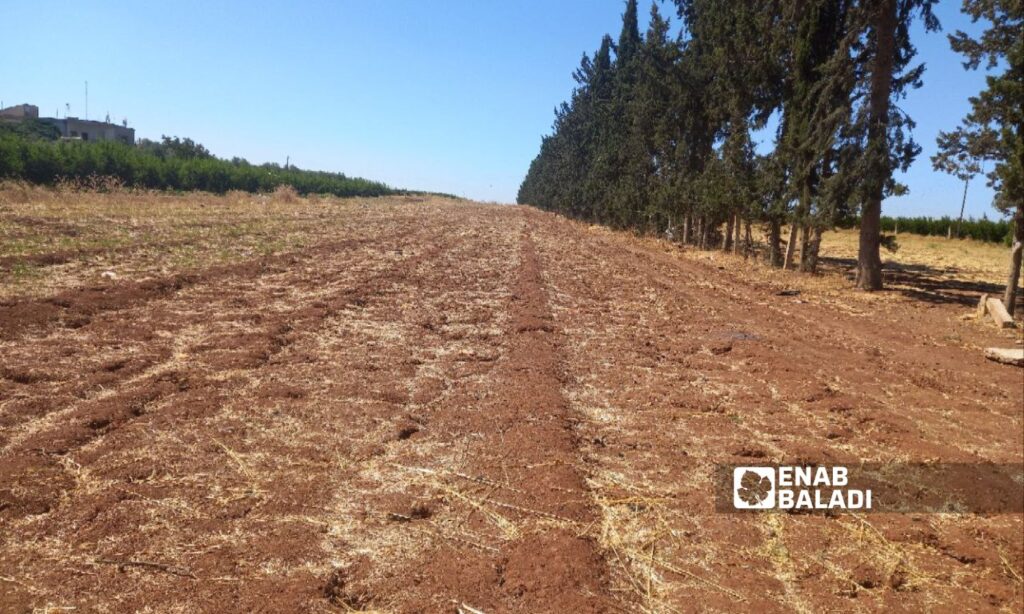Daraa – Halim Muhammad
The sale and purchase of agricultural land in the western countryside of Daraa, southern Syria, is witnessing a great stagnation, which has affected its prices compared to previous years.
And with the decrease in the demand for land, the supply by the owners increases for several reasons, including their desire to emigrate and their need for large sums to cover expenses, in addition to the drought of the lands and the additional expenses imposed on farmers for agriculture.
Emigration motive
Zaher, 25, a resident of Muzayrib, sold four dunums three years ago to save $8,000 for the cost of the migration trip, explaining that he found no way to collect this amount other than selling his agricultural property.
Agricultural real estate prices have recently witnessed a decline in value due to a lack of demand.
Mohammad, 28, told Enab Baladi that he sold his real estate, an area of about ten dunums, last May at a price of 15 million Syrian pounds (about $1,200) per dunum.
Mohammad sold the land with the aim of migrating as well, considering that its selling price is less than what it deserves. However, the decrease in the price was affected by the depreciation of the Syrian pound against foreign currencies.
Abboud al-Zoubi, an owner of a real estate office in Tafas town in the western countryside, attributed the decline in agricultural real estate prices to the large number of sales requests, pointing out that most of the sellers are willing to emigrate, and this contributed to their acceptance of selling at low prices.
Regarding the average real estate prices, al-Zoubi told Enab Baladi that it is not possible to set a unified price for agricultural real estate, as prices are affected by the location of the land, its proximity to the city center, and the extent of access to services.
Al-Zoubi estimated that the real estate offered is twice as high as the demand, and most of the buyers currently are from the region’s residents outside Syria, who emigrated to Europe in recent years.
Pound fluctuations effect
The selling prices of agricultural lands are announced in Syrian pounds, not in dollars, despite the significant decrease in their value, which affects the real property value.
The Syrian pound is witnessing a continuous decline in its value against foreign currencies, as the exchange rate of one dollar has reached about 13,350 Syrian pounds on August 24.
Ahmed, 38, works as a mediator between buyers and sellers in the real estate sector in return for an amount he receives from both parties. He told Enab Baladi that some owners of lands offered for sale fix their prices in dollars orally, but when registering the contract, it must be in Syrian pounds.
Youssef, 35, offered a 5-dunum land for sale about a year ago. He registered the property with its features in a real estate office, and the required price has not yet been paid to him by those wishing to buy.
Youssef told Enab Baladi that he had received an offer in 2020 to sell the land at an “attractive” price, amounting to six million per dunum ($3,000) at the time, but he refused to sell it in order to get a better price.
Currently, Youssef is receiving offers estimating the purchase price of one dunum at 15 million Syrian pounds (about $1,200), which means that the value of the sale has decreased by more than half in three years.
Drought is a ‘reason to escape’
After most of the springs and groundwater wells dried up in the western countryside of Daraa, agricultural land prices fell, and demand for them decreased.
Real estate broker Ahmed said that buyers now prefer areas that are still rich in groundwater, so the presence of water has become an important factor in raising the prices of agricultural real estate.
He added that the dryness of water in the western countryside of Daraa increased the stagnation of real estate sales and lowered their prices because the customer buys rainfed land that depends on rainwater only.
During last July, the hot springs of Ayoun al-Abed and Lake Zayzoun dried up, preceded by the drying up of Lake Muzayrib in addition to a large number of underground wells.
“Non-existent” services control the price
The price of the property changes and increases if it is close to the city, or if it is within a zoning plan, or if it overlooks a public road, or if there are electricity, telephone, and sewage networks.
Al-Zoubi says that overlooking a road increases the property’s price, as well as if it is close to cities, because urban expansion will raise the value of the property in the future while reducing the importance of the presence of electric energy, as most areas are subject to long power rationing of up to five hours of disconnection and an hour of connection, and this feature does not currently serve farmers, as they rely on solar energy as a main source for pumping water.
While the real estate broker said that although electricity is not important, it is included in the account of the buyer because the access of the network to the field will raise the value of the property in the event that electricity returns to normal, according to Ahmed.
Governmental efforts are absent from improving real estate specifications in Daraa, as it has stopped building main roads or delivering services to agricultural lands since 2011, and irrigation water pumping projects have also stopped due to the drought of springs.

